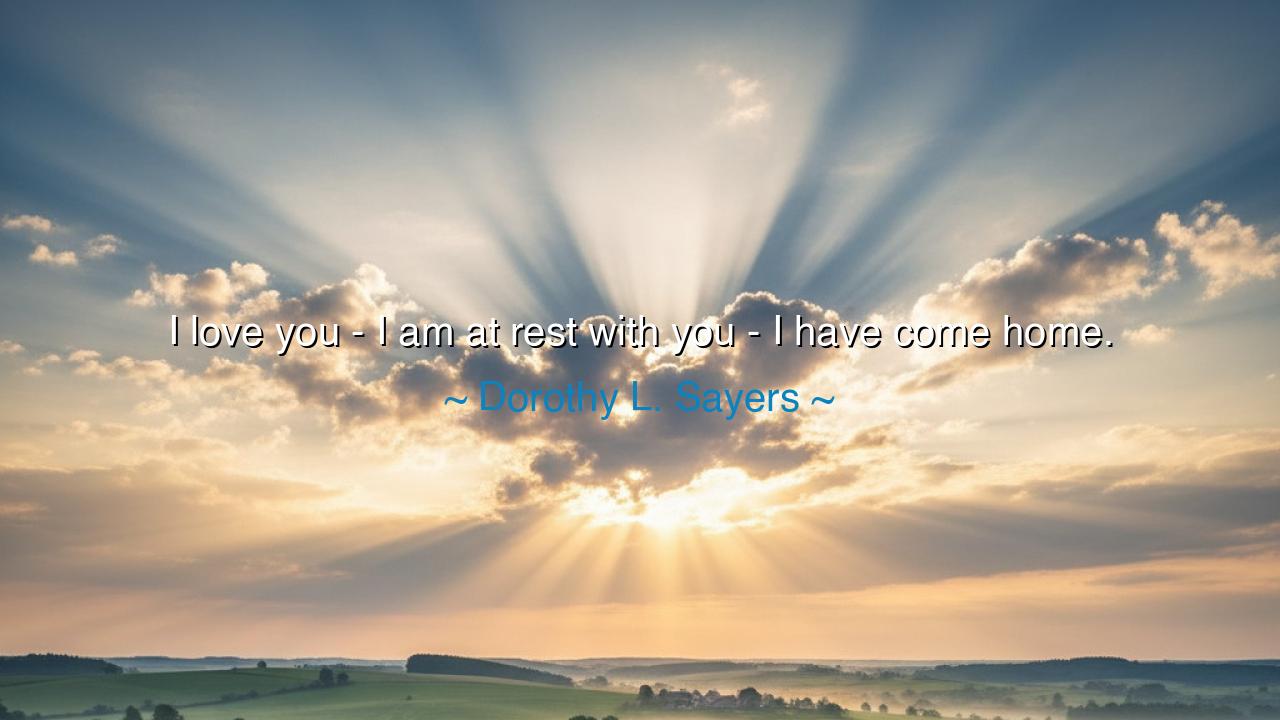
I love you - I am at rest with you - I have come home.






“I love you — I am at rest with you — I have come home.” These words of Dorothy L. Sayers carry the weight of a lifetime’s search for belonging, the deep sigh of a soul that has wandered through solitude and finally found its harbor. It is not the youthful cry of fleeting passion, but the quiet hymn of one who has found peace in another’s presence — a peace that does not clamor or demand, but simply is. In these few words, Sayers captures the eternal yearning of every heart: to love, to rest, and to find home — not merely in a place, but in a person, in a bond that feels as ancient as creation itself.
Dorothy L. Sayers, the great English novelist, poet, and theologian, wrote often of love not as desire alone, but as the union of minds and spirits. Her vision of love was intelligent, fierce, and sacred — not a fleeting emotion, but a covenant of understanding. To say “I love you” is the simplest and most profound act a human being can perform. Yet in Sayers’ words, love is more than affection; it is arrival. To love and be loved is to cease wandering. It is to come home from the long exile of the self. When she writes, “I am at rest with you,” she speaks of the divine stillness that enters when two souls recognize one another — not as strangers, but as echoes of the same eternal note.
In the story of human life, there are many homes we seek: the warmth of family, the acceptance of friendship, the purpose of work, the mystery of faith. But none is as complete as the home found in true love — the kind that does not imprison, but liberates. To come home in this sense is not to stop moving through life, but to carry peace within one’s steps. The ancient poets of Greece called it oikos, the hearth of the soul. The mystics of every age have called it union. It is that moment when the restless heart no longer asks, “Where do I belong?” for it has already found its answer.
Consider the story of Ruth, from the sacred texts of old. When famine struck her homeland, she journeyed with her mother-in-law Naomi into a foreign land. Though she was a stranger among strangers, her heart knew no fear, for love had already chosen its dwelling. “Where you go, I will go,” she said. “Your people shall be my people.” And in time, Ruth found both love and home — not because she sought wealth or comfort, but because she was faithful to love itself. So it is with every soul: love is the compass that leads us home, no matter how far we have strayed.
But Sayers’ words hold another truth — that home is not always found in another person, but sometimes within one’s own being. To love deeply is also to discover oneself. When we love truly, we see the reflection of our best and most honest self in another’s eyes. In this way, love becomes a mirror, revealing not who we pretend to be, but who we are meant to be. To say, “I have come home,” is to say, “I have come to peace with myself.” The journey of love, then, is both outward and inward — a pilgrimage to another’s heart that brings us back to our own.
In a world of ceaseless striving, where people rush from one desire to another, Sayers’ words stand as a sanctuary of stillness. They remind us that the truest love is not frantic or uncertain, but calm and abiding. It does not burn out; it endures. It is not the tempest, but the quiet shore after the storm. When you find such love — whether in a person, a calling, or in faith — cherish it. Guard it with reverence. For few treasures on earth equal the peace of knowing, “I am home.”
So, my child of the wandering heart, learn this: do not seek love in haste, nor confuse it with possession or flattery. Seek the love that lets you rest. Seek the soul beside whom your spirit falls silent, not from emptiness, but from fullness. Let your love be a harbor, not a cage — a place of rest, not restlessness. And when you find it, or when you become it for another, speak as Sayers spoke, not with the noise of passion, but with the stillness of truth: “I love you — I am at rest with you — I have come home.” For in that moment, you will have touched eternity.






AAdministratorAdministrator
Welcome, honored guests. Please leave a comment, we will respond soon